- Blog
- Geo Mapping
- How Custom Pin Mapping Helps You See Trends at a Glance
When your data is trapped in spreadsheets, it can be hard to identify the bigger picture. Custom pin mapping solves that problem by turning rows of addresses, customer lists, or sales figures into a digital pin map you can interact with. Instead of numbers on a page, you get a clear view of where activity is happening and how it’s distributed. Trends that might take hours to uncover in a report become obvious in seconds. By creating a map with pins tailored to your needs, you get a visual tool that reveals insights at a glance and makes decision-making faster and smarter.
WHAT IS CUSTOM PIN MAPPING?
Custom pin mapping is the process of creating a digital pin map that displays data points as pins on a geographic layout. Each pin represents a location—such as a store, customer, or delivery point—giving you immediate visibility into where your business activity takes place. Unlike generic maps, custom mapping lets you design how pins look, what labels they display, and how they’re grouped. This means you’re not just plotting points—you’re building a map customized to your business strategy. With pin mapping, trends and opportunities are no longer buried in spreadsheets—they’re visualized right in front of you.
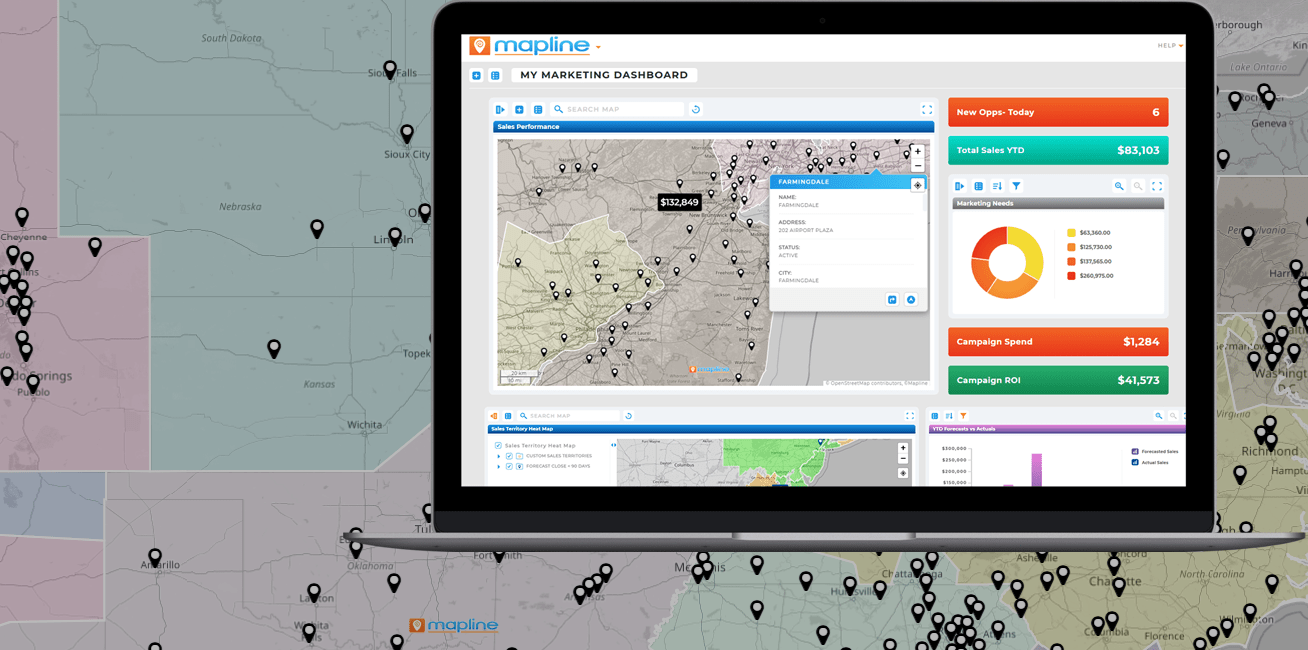

Pro Tip: Don’t stop at just creating a map with pins free of customization. Use Geo Mapping’s custom mapping features to color-code, label, and filter your pins. The more detail you add, the more powerful your insights become. Even simple tweaks can turn a generic digital pin map into a strategic dashboard.
WHY BRANDS NEED CUSTOM PIN MAPS
In a data-driven world, brands can’t afford to rely on generic visuals. Standard maps with identical pins only show locations—they don’t explain what those locations mean for strategy. But the right mapping software empowers you with custom pin maps that solve this challenge with context, clarity, and storytelling, all from your data. With customized pins, brands can highlight performance, track customer engagement, and uncover opportunities that spreadsheets alone can’t reveal. The ability to create a custom map with pins turns everyday data into a competitive advantage that fuels smarter marketing, stronger sales, and better operations.
Stand Out with Data Storytelling
Brands that use custom map pins can transform dry numbers into compelling visual stories. Instead of overwhelming stakeholders with spreadsheets, you present a clear picture of how and where business activity is happening. Whether it’s customer clusters, sales trends, or campaign results, these visuals make insights easy to understand and share. Storytelling through maps builds confidence with leadership teams, investors, and clients. It also helps internal teams align quickly on priorities because the message is instantly clear.
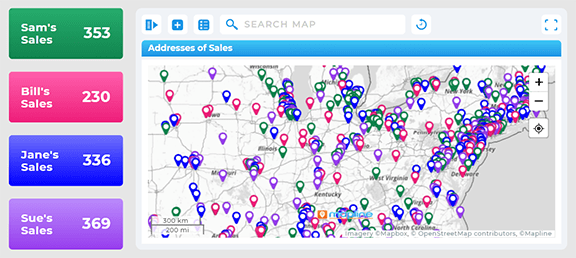
Drive Smarter Business Strategies
Custom mapping allows brands to see the bigger picture and make data-driven decisions. By creating a digital pin map, you can identify underserved markets, highlight top-performing regions, or spot inefficiencies in service coverage. These insights directly inform strategies for expansion, marketing spend, and resource allocation. When decisions are guided by visual data, they become faster, clearer, and more accurate. Custom pin maps ensure that your strategy is grounded in facts, not guesswork.

Enhance Customer Engagement
Customers expect personalized experiences, and custom maps make that possible. By segmenting audiences and creating pins on a map that reflect customer types or behaviors, brands can tailor messaging and outreach with precision. For example, premium customers might appear as gold pins, while budget-focused buyers show in blue, helping marketers craft campaigns that resonate. Personalized visuals not only improve targeting but also increase engagement and loyalty. With custom pin mapping, brands can see their audiences more clearly and respond more effectively.
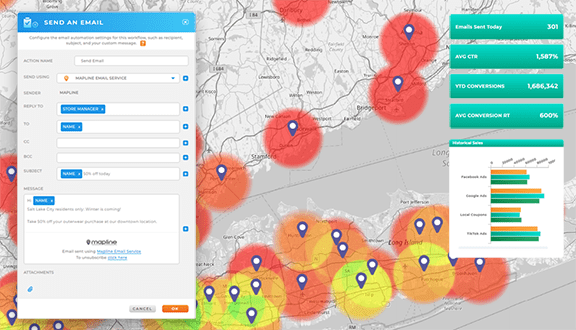
From Data to Visual Insights
Creating a map with pins is as simple as uploading an Excel or CSV file into Mapline. Within seconds, your data is transformed into an interactive map. Instead of manually analyzing rows of addresses, you can see them clustered on a map, making patterns easier to recognize. This shift from static numbers to dynamic visuals accelerates analysis and helps you focus on what matters most. Whether you’re tracking sales, customers, or assets, pin mapping unlocks a new level of clarity.
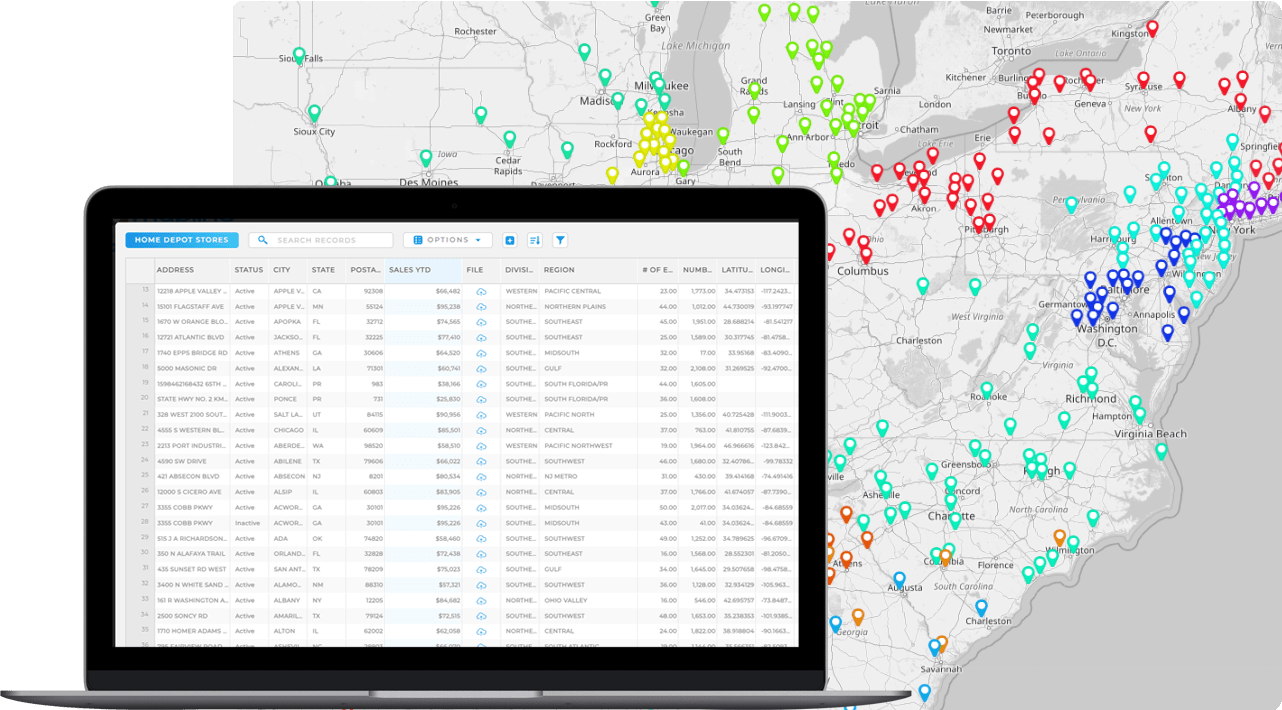
Why Customization Matters
Generic map pins don’t provide much context. Custom mapping, however, allows you to change pin colors, shapes, and labels so your map reflects the story your data is telling. For example, you might use green pins for high-value accounts, blue pins for standard customers, and labels to display revenue or assigned reps. These design choices aren’t just cosmetic—they make your map more functional. The ability to customize pins turns your map into a tool for strategy, not just a static visual.
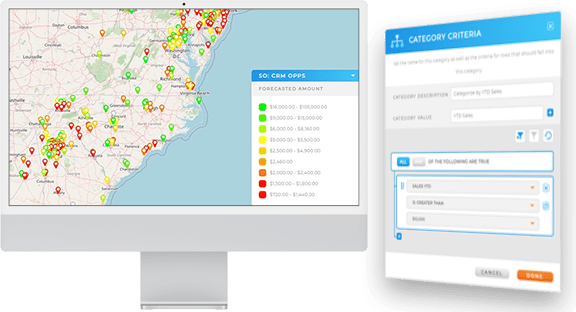
HOW CUSTOM PIN MAPPING HELPS YOU SEE TRENDS
The biggest advantage of custom pin mapping is its ability to make trends visible instantly. Patterns that might remain hidden in raw data become obvious when viewed as pins on a map. You can identify growth areas, spot performance gaps, and track customer clusters—all at a glance. This makes pin mapping invaluable for sales, marketing, and operations teams alike. By building your own map, you take control of your data and unlock insights that drive smarter business decisions.
Spot Geographic Clusters
A digital pin map makes it easy to identify clusters of customers, leads, or activity. These clusters often reveal opportunities—such as regions with strong demand or underserved areas where you could expand. Instead of scanning rows of addresses, you can see groupings visually, making them impossible to miss. Clusters are especially useful for planning territories, launching marketing campaigns, or optimizing service coverage. Pin mapping helps you connect dots that spreadsheets can’t.
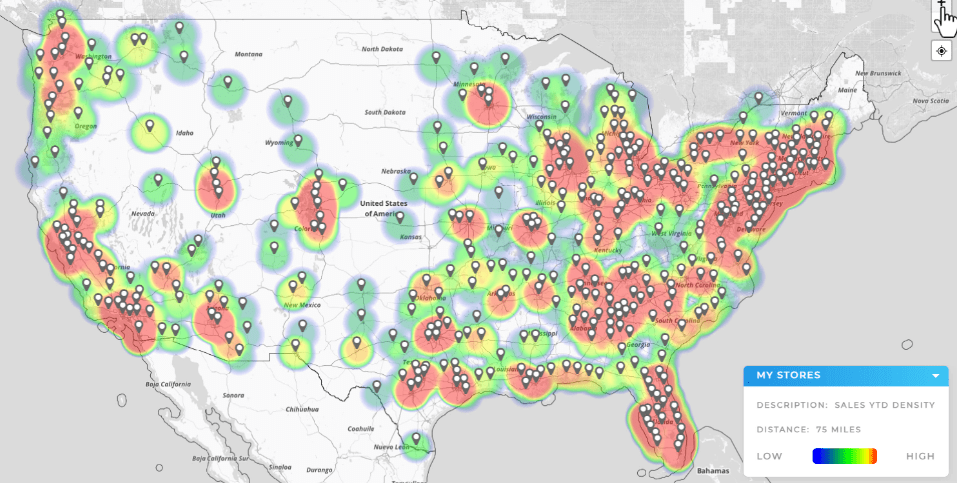
Track Performance Over Time
With custom map pins, you can track performance across time periods and compare trends visually. For example, you might plot quarterly sales data and immediately see which regions are improving and which are declining. Adding time-based filters makes the map dynamic, showing you changes as they happen. This visual approach allows managers to respond faster, adapt strategies, and measure progress more accurately. Performance that once required complicated reports is now visible in seconds.
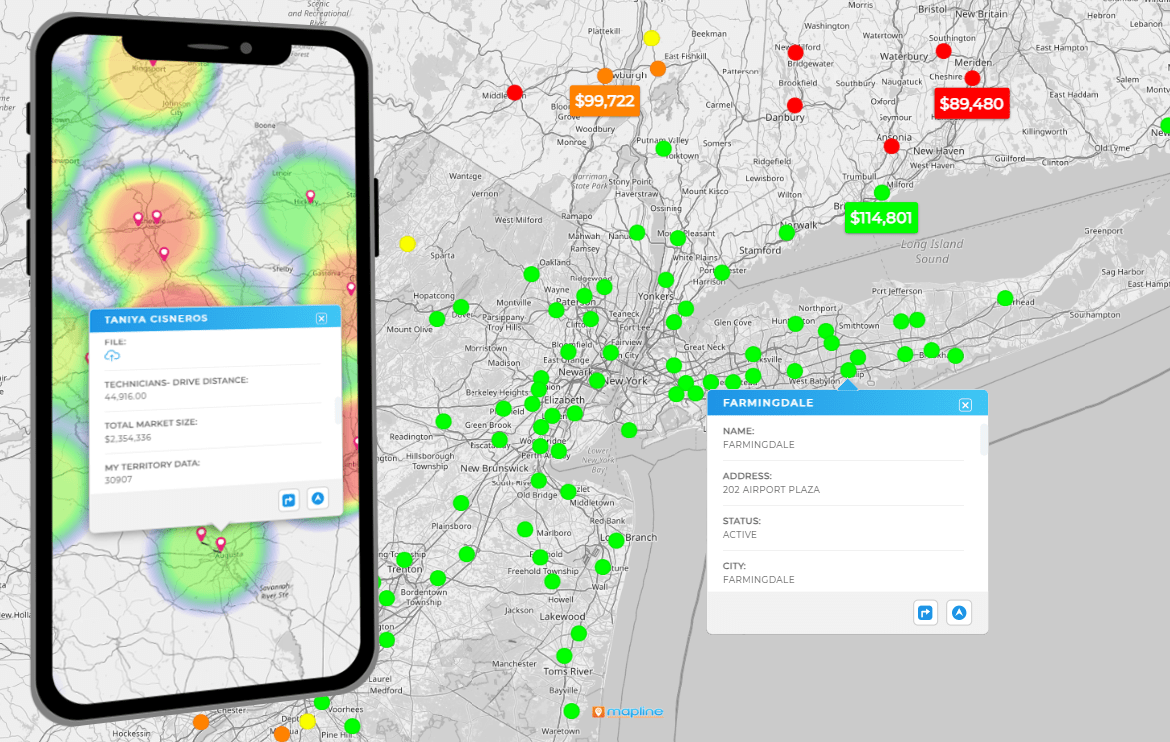
Reveal Service Gaps
Creating a map with pins also highlights gaps in coverage. You can instantly see where you lack service locations, delivery routes, or sales presence. These gaps often represent missed opportunities for growth. By filling them strategically, businesses can improve customer satisfaction and expand their reach. Without a map, these blind spots are easy to overlook. Custom pin mapping ensures you’re not just seeing where you are—but also where you should be.
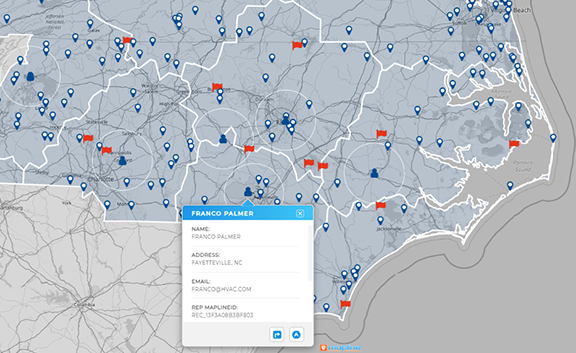
USE CASES FOR CUSTOM PIN MAPPING
Pin mapping isn’t just a visualization tool—it’s a versatile strategy that supports many different parts of a business. From sales to logistics to marketing, custom maps help teams act faster and smarter. Here are some of the most common use cases where creating a map with pins delivers value:
Sales Territory Planning
Sales teams can create a custom map with pins to align territories with customer density and revenue potential. This ensures reps focus on the right accounts and no region is underserved. With labeled pins, managers can see high-value opportunities instantly and assign resources where they’ll make the biggest impact. A digital pin map becomes a guide for maximizing growth.
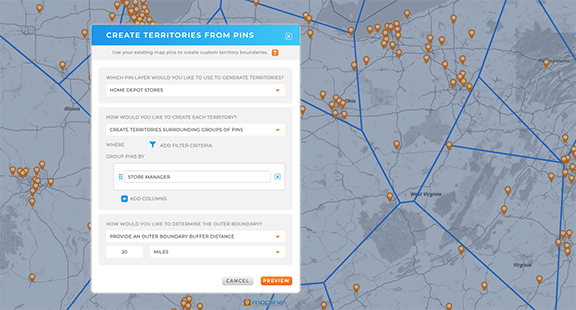
Marketing Campaign Tracking
Marketing teams can build their own map to track campaign responses by geography. Each pin can represent a signup, lead, or purchase, making it easy to compare results across regions. This helps marketers fine-tune targeting, adjust messaging, and allocate budgets more effectively. Instead of broad assumptions, campaigns become data-driven and location-specific. Pin mapping makes marketing measurable in real time.
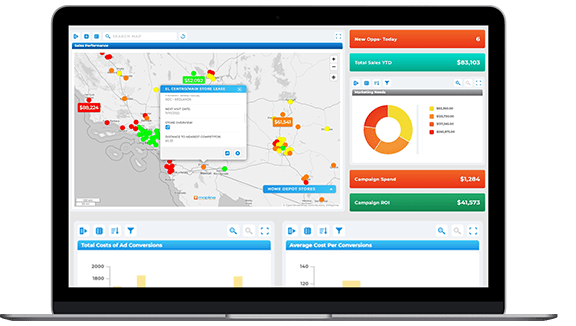
Logistics and Delivery Optimization
Operations teams use pin mapping to visualize delivery routes, dispatch assignments, and vendor networks. By creating pins on a map, managers can quickly spot inefficiencies and optimize routes to save time and fuel. Service coverage can be analyzed to ensure customers are reached quickly and consistently. For logistics-heavy businesses, custom pin mapping is an essential tool for efficiency.
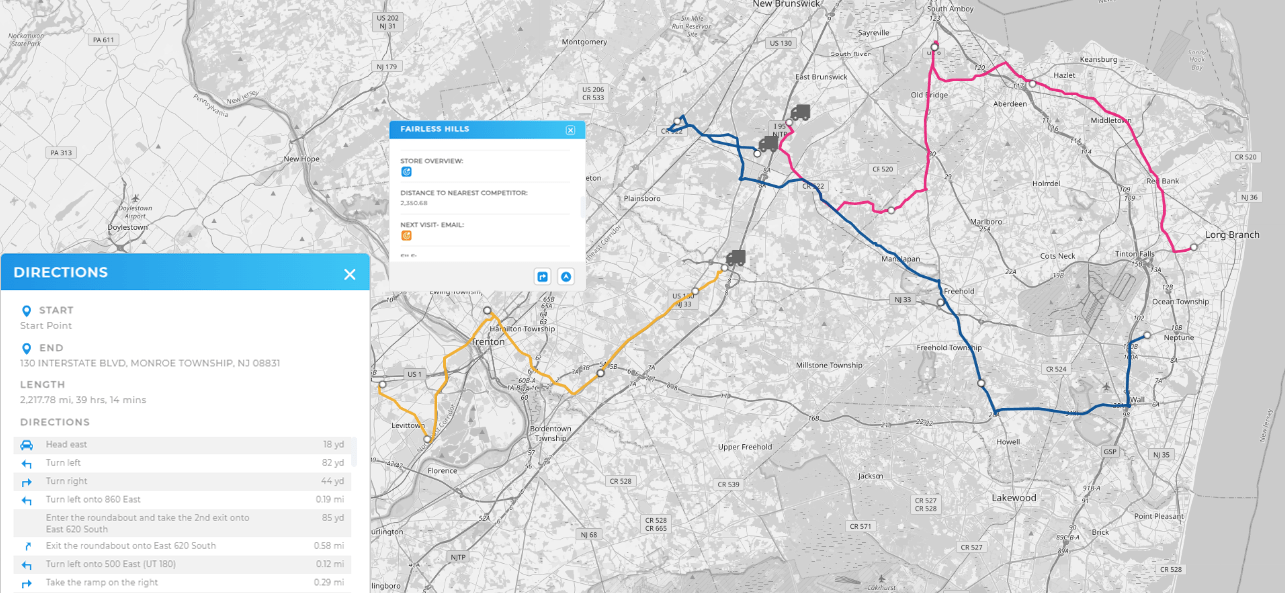
Field Service and Technician Scheduling
Custom pin mapping is a game-changer for businesses that rely on field service teams or technicians. By plotting service calls, customer addresses, and technician locations on a map, managers can instantly see where resources are needed most.
Pin maps also help balance workloads by showing which regions are overloaded and which have capacity. With real-time updates and filtering, field service managers can adapt schedules quickly to meet customer needs and keep operations running smoothly.
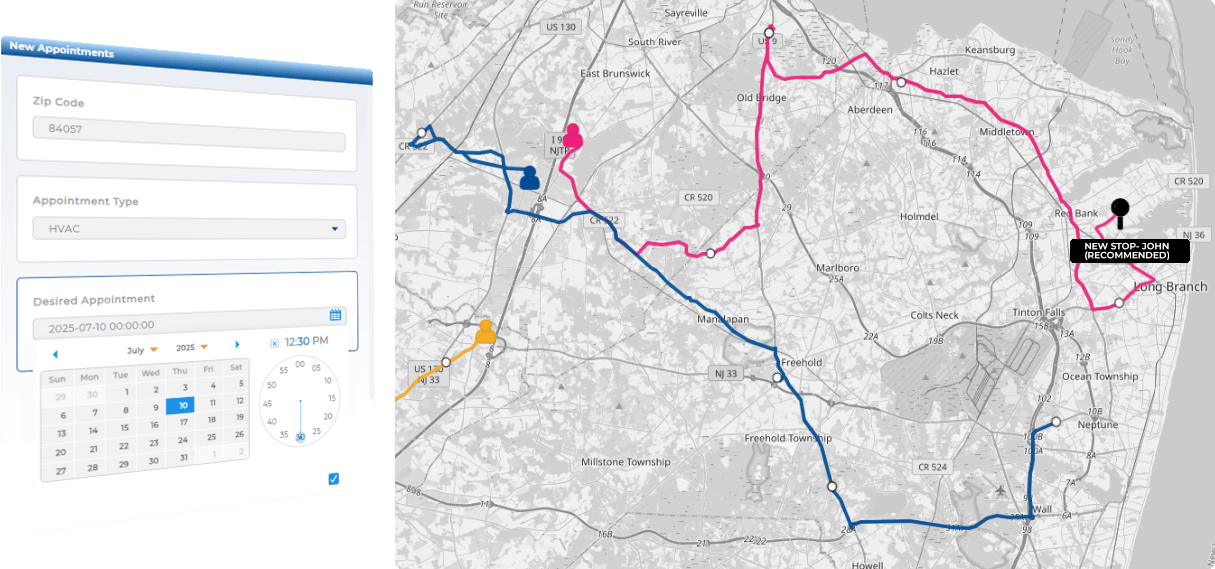
Pin mapping is the process of plotting data points as pins on a map, turning spreadsheets into visual insights.
With Mapline, you can import an Excel or CSV file and instantly create a custom map. You can then customize pins with colors, icons, and labels for clarity.
Yes, Mapline offers options to create a map with pins free of charge, making it easy to get started with custom mapping.
Pin mapping helps identify geographic clusters, gaps in coverage, and performance patterns over time. These insights guide smarter business strategies.
Customization ensures your pins tell a story. By adjusting pin colors, labels, and icons, you can highlight what matters most and make data instantly actionable.









